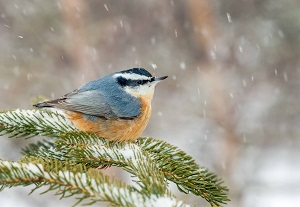
MONTPELIER, Vt – Vermonters love to see birds around their home, and putting out bird feeders is a popular way to attract our feathered friends to back yards. Vermont is among the top states in the country for people who report feeding and watching birds near their home.
However, birds aren’t the only wildlife attracted by birdseed. Vermont’s abundant bear population is increasingly coming into conflict with people as they raid people’s bird feeders, often leading the bear to continue to seek food sources in residential areas. As a result, the Vermont Fish & Wildlife Department urges Vermonters to hold off on putting bird feeders out until snow is well-established. With plenty of seeds and berries on the landscape, birds have enough native foods to tide them over until bears are hibernating.
“Nature provides birds with ample natural food options, from flowers to seeds to fruits and insects,” says John Buck, Vermont Fish & Wildlife’s migratory bird biologist. “Vermonters can plant a variety of native plants and provide other resources that will naturally attract birds from spring through fall. These natural food sources are healthy for birds and provide bird-lovers with a safe alternative to putting out bird feeders. Providing natural food sources also helps prevent a concentration of birds in one place around a feeder, reducing the likelihood of disease transmission and unnatural predation rates.”
As Vermonters put their gardens and yards to bed this fall, Buck has several recommendations for fall plantings, as well as seeds to procure for the spring, that will safely encourage birds in backyards:
- Maintain natural diversity in your yard by adding fruiting shrubs, mixed-age trees, tall grasses, and bare patches to welcome several species and fulfil multiple habitat requirements.
- Plant a variety of native plants to provide food sources for birds, such as dogwood, choke cherry, or highbush blueberry. A list of local native shrubs that attract birds and other wildlife can be found at vtfishandwildlife.com.
- Purchase seeds for spring planting including black-eyed Susan, milkweed, and coneflowers.
- Help birds overcome parasites by providing dust baths made of equal parts fine sand and wood ash in a bird bath or small planter.
- Provide water year-round.
By encouraging birds to backyards with natural gardens of flowers, seeds, and berries instead of store-bought seeds, More information: http://tinyurl.com/VtBackyardHabitat
For Immediate Release: October 2, 2018
Media Contacts: John Buck, 802-476-0796
